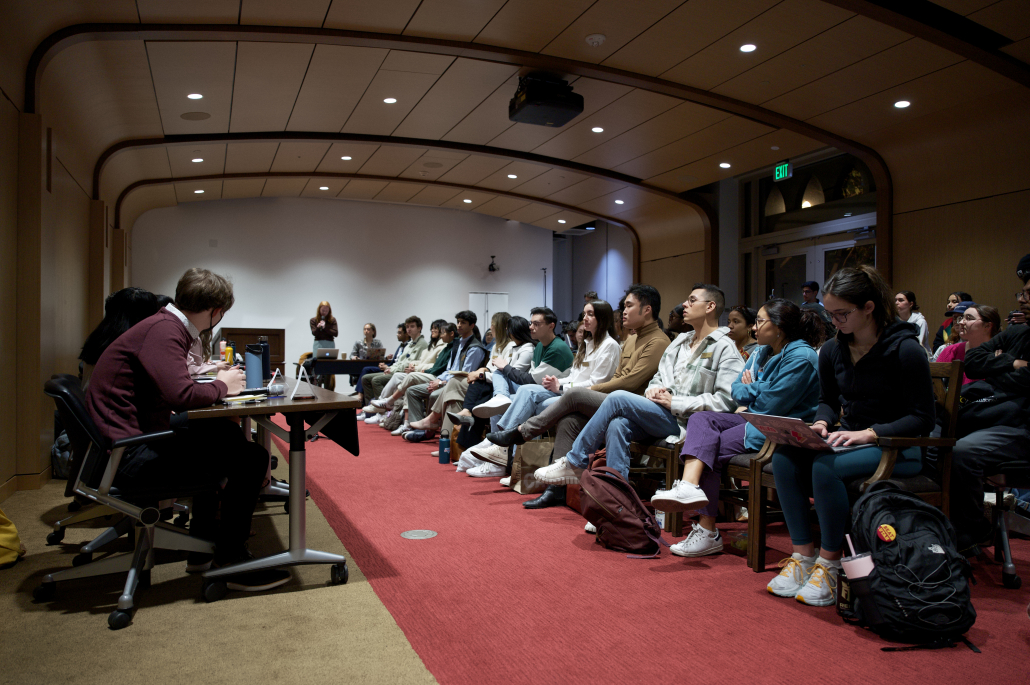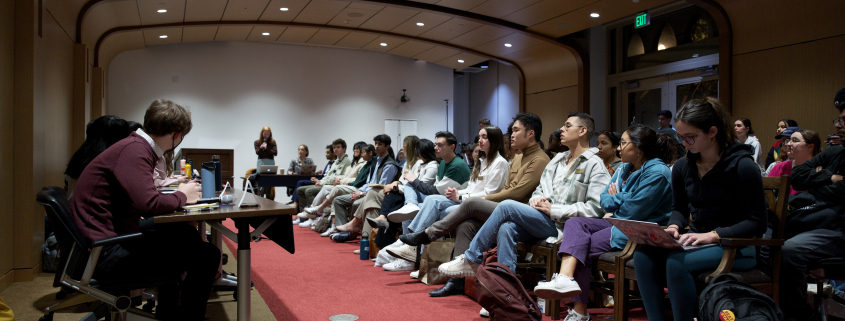Candidates spar at USG presidential debate

The recent switch to shared Fryfts, USC’s impact on the South Central community, fraternity disaffiliation, mental health, drug abuse and sexual assault were all hot-button issues highlighted in the two-and-a-half-hour Undergraduate Student Government presidential debate held Thursday night at Wallis Annenberg Hall, hosted by Annenberg Media.
Students gathered to hear from the five executive tickets running for 2023-2024 USG president and vice president, the largest group of candidates in recent history.
Tickets present were: Yoav Gillath and Monica Rodriguez; Miko Mariscal and Andrew Taw; Divya Jakatdar and Michelle Lu; Devin Ayala and Navya Singh; and Aidan Feighery and Ashley Ka. Annenberg co-executive editors Charlotte Phillipp and Nataly Joseph moderated the debate.
The Feighery-Ka and Gillath-Rodriguez tickets said they saw registered student organizations as key to effective change on and off campus, and said that they would prioritize partnership between USG and RSOs if elected.
“USC has so many unique strengths as an educational institution that can be used [for a positive impact],” Feighery and Ka said, explaining their plan to support existing outreach projects on campus instead of investing funds into new USG initiatives that may not be as effective.
Gillath and Rodriguez explained their plan for a new “Trojan Partners” program to directly link RSOs and the community, while the Mariscal-Taw and Ayala-Singh tickets both called for increased conversations on USC’s campus about gentrification in South Central.
To promote mental health awareness on campus, Gillath and Rodriguez proposed “Mental Health Mondays” with puppies and goat yoga. The Mariscal-Taw ticket responded and said puppies and yoga aren’t “a long-term solution.” The ticket, instead, wants to highlight existing resources and expand resources available in USC’s cultural centers.
Jakatdar and Lu proposed developing a commuter mental health program and creating a physical space on campus dedicated to mental health with resources, food and nap pods. The ticket also wants to expand free therapy sessions for students.
Candidates touched on Greek life and the disaffiliation of fraternities. All candidates agreed Greek organizations have a place at the University and the best path forward is through collaboration on the issues of sexual assault and drug overdose.
Ayala and Singh, the latter being the current vice president of judicial affairs of the USC Panhellenic Council, said they want to work with the Panhellenic Council and the executive board of the University Park Interfraternity Council to create lines of communication and on joint initiatives.
“If we ostracize and alienate members of fraternities or members of UPIFC, that is the exact thing we cannot do,” Ayala said. “They’re not going to want to compromise. They’re not going to want to work with Panhellenic, USG or the University.”
Jakatdar, a member of Greek life, recounted how her friends had previously found fentanyl in their drugs. She and Lu reiterated that maintaining a relationship with UPIFC was crucial to drug safety on campus.
“Drugs are going to be done,” Jakatdar said. “Let’s make sure it’s as safe as possible.”
Current USG president Hannah Woodworth compared each candidate’s plans to address student concerns with the Fryft program, noting that the campaign presented by Mariscal and Taw, the only non-senators running, was also the only one that did not address Fryft.
Feighery and Ka appealed to feasibility to defend their platform, explaining that the University has stated that it will not return to a single-rider Fryft program. They proposed, instead, to implement a policy for limited single rides and unlimited shared rides.
Gillath offered a different perspective to Fryft changes, remembering that the University has, in the past, backtracked its decisions, such an initial aversion to the meal swipe donation program he pioneered. Both the Gillath and Rodriguez ticket and the Ayala-Singh ticket emphasized the importance of student and parental outcry in changing University policy.
“Parents — throughout the public outcry — can get the university to switch things,” Rodriguez said.
Jakatdar and Lu proposed adding a $200 transportation fee to student tuition to cover a complete return to free single rider Lyfts.
“We should not be giving you false hope and false promises,” Mariscal said.
USG voting will open Tuesday and close Feb. 26.

